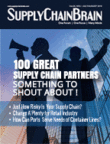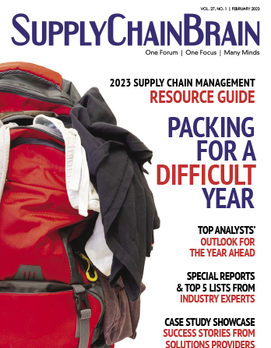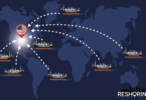
Home » Cross-Border Trade Requires Robust Customs Broker
Cross-Border Trade Requires Robust Customs Broker

August 11, 2016
Why stick with good when better is readily available? That was the happy situation that faced Agrium Inc., a major supplier of agricultural products, when it began to explore whether it could improve on its Customs brokerage.
The Calgary-based multinational is a major retail supplier of agricultural products and services in North America, South America and Australia and a wholesale producer and marketer of major agricultural nutrients and a supplier of specialty fertilizers in North America.
Agrium, formerly Cominco Fertilizers Ltd., can trace its founding to 1931. Today, it operates approximately 1,500 retail agricultural centers in the U.S., Canada, South America and Australia under the brand names Crop Production Services, Crop Production Services Canada, Agroservicios Pampeanos S.A. and Landmark.
Agrium's wholesale arm produces nitrogen, phosphate, potash and sulphur-based fertilizers. This segment also owns and operates a potash mine and production facility in Saskatchewan, Canada, and a phosphate mine in Conda, Idaho.
With that much cross-border trade, it's no wonder that Agrium sought a compliance-focused Customs broker to facilitate error-free clearance of shipments from Canada to the United States via rail and truck load. The solution Agrium wanted called for 24/7 service and full EDI support. Agrium’s transition, including 30,000+ entries annually, had to be seamless.
In fact, the company already had a partnership with a Customs broker, and the relationship was working relatively fine, according to Ron Oikawa, a Customs specialist with the agricultural products company.
However, a standing mandate to periodically be on the lookout for opportunities to fine-tune or even replace relationships led Agrium ultimately to team with A.N. Deringer, a third-party logistics service provider that specializes in Customs brokerage.
“Every two to four years, we are obligated to test the market,” says Oikawa. “In doing so, it opened our eyes to what providers can do.”
As it happened, Agrium had performed a best-in-practice review of brokers some years before, and had narrowed the list of possible partners to two or three.
When it came time to test the market once again, Oikawa says, Agrium immediately looked to compare its list of finalists with its present partner.
“Our previous partner was OK, there really were no big complaints,” he says. “But the Deringer systems were just more robust. Looking at our best-in-practice review from before, we found that Deringer matched what we wanted.”
The result? “Of course, you never know until you make the move. But once we did make the transition, everything we needed came to reality.”
Identifying up front what Agrium needed was key to winning the contract, says Shane Jaffary, Deringer national account executive. “When they first came to us, they just wanted us to demonstrate our best practices,” Jaffary says. “But there were two key things we did. We demonstrated our technology capabilities. And Agrium had a huge need for a responsive EDI component. That was due to loading facilities at international border crossings, and time was of the essence.” Deringer was able to satisfy Agrium's need for full-time, real-time EDI support.
Certainly, reporting capabilities for compliance requirements had to be very strong, and Deringer passed muster there as well. But geographic location was a major concern of Agrium management, and Deringer's willingness to place a service center in the same time zone where much of the Canadian company's operations were was key to winning the bid.
“We had the boots on the ground to support them, in the western U.S. and in the Great Lakes area,” Jaffary says. “So we were a good fit versus the model they had – we were in a better position to provide a bit more than what they were getting with their previous provider.”
Oikawa says with former employers he has experienced five or six similar transitions from one broker to another; this was the most seamless and trouble-free, he says. And Deringer's willingness to put the service center into Sweet Grass, Mont., was one of the major reasons for the smooth switch-over.
“A lot of the big companies that we talked to focus their customer centers in the East. We are a western-based company – our business is for most part west of the Great Lakes. The fact that they are in the same time zone and have the same contact hours expands our ability to contact somebody if we need them by several hours a day.”
Oikawa says he doesn't expect any partner, certainly not a Customs broker, to do the client's work. “But we do emphasize that in our view a partnership means whether you're a broker or a carrier or whatever, that you have to be someone that we can talk to. We want people we can talk with on any level on any subject, who are intelligent and can talk to us.”
During the transition, and since, Oikawa says, Agrium management felt that every question that arose was answered because of Deringer's readiness to mutually figure out how to proceed.
“It takes two to dance,” Jaffary says. “Agrium was very nimble and flexible, and both parties have to be like that for it to be a true partnership.”
Resource Links:
Agrium
A.N. Deringer
RELATED CONTENT
RELATED VIDEOS
KEYWORDS Freight Forwarding/Customs Brokerage Global Logistics High-Tech/Electronics Industrial Manufacturing Logistics Logistics Outsourcing RFID & Barcode Technology Transportation & Distribution Transportation Management
Related Directories
Subscribe to our Daily Newsletter!
Timely, incisive articles delivered directly to your inbox.
Popular Stories

2023 Supply Chain Management Resource Guide: Packing for a Difficult Year
VIEW THE LATEST ISSUECase Studies
-
JLL Finds Perfect Warehouse Location, Leading to $15M Grant for Startup
-
Robots Speed Fulfillment to Help Apparel Company Scale for Growth
-
New Revenue for Cloud-Based TMS that Embeds Orderful’s Modern EDI Platform
-
Convenience Store Client Maximizes Profit and Improves Customer Service
-
A Digitally Native Footwear Brand Finds Rapid Fulfillment



